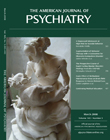Augmentation of Behavior Therapy With d -Cycloserine for Obsessive-Compulsive Disorder
Abstract
Objective: This study examined whether d -cycloserine, a partial agonist at the N -methyl- d -aspartate (NMDA) glutamatergic receptor, enhances the efficacy of behavior therapy for obsessive-compulsive disorder (OCD). Method: A randomized, double-blind, placebo-controlled trial investigating d -cycloserine versus placebo augmentation of behavior therapy was conducted in 23 OCD patients. Patients first underwent a diagnostic interview and pretreatment evaluation, followed by a psychoeducational/treatment planning session. Then they received 10 behavior therapy sessions. Treatment sessions were conducted twice per week. One hour before each of the behavior therapy sessions, the participants received either d -cycloserine, 100 mg, or a placebo. Results: Relative to the placebo group, the d -cycloserine group’s OCD symptoms were significantly more improved at mid-treatment, and the d -cycloserine group’s depressive symptoms were significantly more improved at posttreatment. Conclusions: These data provide support for the use of d -cycloserine as an augmentation of behavior therapy for OCD and extend findings in animals and other human disorders suggesting that behavior therapy acts by way of long-term potentiation of glutamatergic pathways and that the effects of behavior therapy are potentiated by an NMDA agonist.



